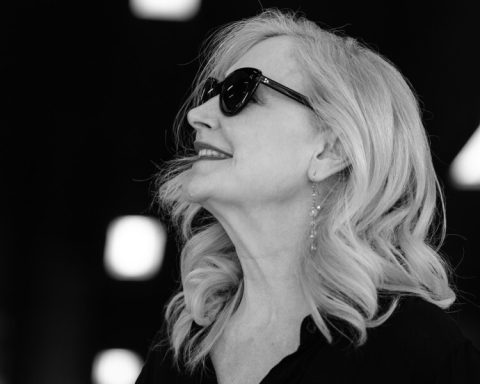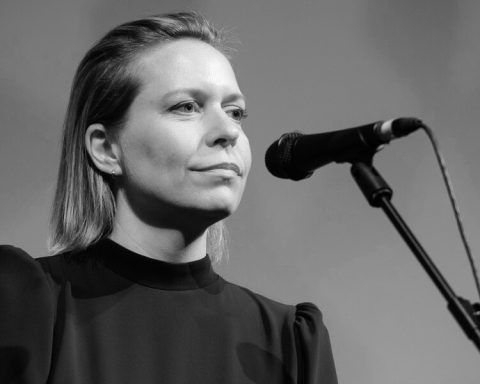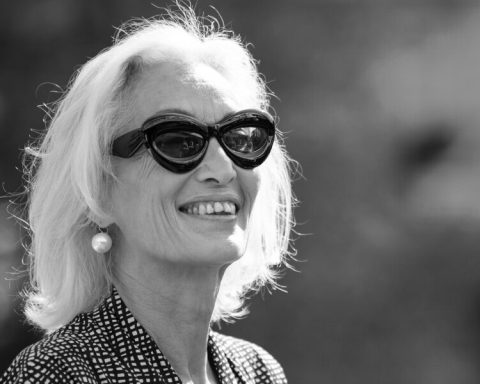Indie super-producer Christine Vachon has always been vocal about all the issues plaguing the independent film sector and then some. She was feted at this year’s Karlovy Vary International Film Festival with a career tribute involving, among others, a masterclass and screenings of two of her most recent films, the Ewan McGregor-starrer You Sing Loud, I Sing Louder by Emma Westenberg and Celine Song’s buzzworthy Sundance hit Past Lives.
Vachon has been heard to say that “with disruption come great opportunities,” – meaning the glass is half-full in terms of opportunities that come to indie and first-time filmmakers as opposed to the streamers’ offer. And yet, we’re being served too much content to consume, “There’s certainly a lot more content creation than there has ever been – probably in my lifetime. And it does seem like there are risks being taken and there’s different kinds of storytelling that streamers, because they are making so much, will take a shot on. We’ve all kind of reached a point of content exhaustion.”
She adds: “Sometimes, when people tell me about something I have to watch, it’s always like, ‘How many seasons is it?’ And, in some ways, I feel like that’s driving us back a little bit towards movies and limited series. But it’s a pendulum. It just keeps swinging and the only thing for sure is your own desire, of how exciting it is to watch something that really makes you feel something.”
Vachon does not waver when it comes to the importance of a film’s theatrical release as it’s gotten “narrower and narrower” nowadays. In fact, when she first started, theatrical was all there was for the kind of films she made. The idea of television was an entirely foreign concept to her – nobody in her line of work made anything for television. “Typically, a Hollywood film, back in those days, would have its theatrical release, and then it would sell usually to a cable network, to airlines, and then eventually it would make its way onto a regular network with commercials and all the nudity and profanity cut out. So, those movies had a real trajectory. But, for our movies, theatrical was dead. So, at that time, we didn’t have to think so hard…I guess for something to really work theatrically, there sort of has to be a big idea,” she explains.
Both films that she produced and that played at Karlovy Vary are by first-time female directors. Recounting how she got on board Past Lives, she says, “This project was a little unusual in that the script had been pretty developed… and a good portion of the cast was already attached. The film had lost its producer and they needed a producer to come on board, who they felt a certain level of confidence in, because Celine was a first-time director. So, Pam Koffler and I sat down with her, with a third partner from Killer, who has since gone on to start his own company – David Hinojosa – and our initial conversation with her was really just about how did she see this and what her vision for it was. It was less mechanical… And it was very clear very quickly that she really understood the story she wanted to tell and that was sort of the linchpin for us because I knew she didn’t have much experience on film sets. But as soon as I realized that she understood her story, I knew we would be able to provide that experience for her.”
As for You Sing Loud, I Sing Louder, she hopped on board because she had been working with Ewan McGregor on Halston and “had a long relationship really just bookended by Velvet Goldmine at the very beginning of his career… And he came up to me on the set and said, ‘You know, don’t get angry with me, but would you read a script that comes from my daughter and her friends?’ And we took a look at it and I thought the writing felt really fresh and authentic. I thought this could be a really interesting opportunity because obviously Clara [McGregor] was attached and we were looking for a writer, and we really felt strongly about giving a female director a shot. Emma ended up being the one that they really responded to the most,” she shares.
Most directors making films under the banner of Vachon’s production outlet Killer Films have control over both the final cut and the film they’re making. And that goes for both the veteran directors and the first-timers. “There isn’t that big of a difference in the sense of how you actually get the movie done. I mean, a day is a day. You have a certain amount of work you have to do each day. Everybody performs their task the way they’re supposed to. Every film has its own weird problems. Some of them have to do with weather or locations or noise. A more experienced director may already have a team that they work with, that they have a shorthand with. They may already have relationships with the actors. They may have more confidence in how to speak to actors. I find that for a lot of first-time directors, a place that produces a lot of anxiety is not how to direct, but how to convey to an actor effectively what you want. But, usually, once you get that, directors get the hang of that very quickly. For first-time directors, I’d say the first couple of weeks, we stay a little close to make sure that they’re understanding what everybody is there to do for them, and that they’re making the most of it, basically,” she says.
In that sense, even though she works with both established directors and newcomers, Vachon insists that there is no difference in her way of working with her directors, especially not based on the number of acclaimed films they may have made over the years, “It evolves because people grow and mature. And most directors will approach different subject matters in different ways. So, we don’t have one set of rules for a more experienced director and a different one for a less experienced director. There are some first-time directors who you see them the second week and will never be able to tell and there are some directors who’ve been doing it for a long time, who still approach the set with a lot of trepidation and anxiety. It really depends,” she elaborates.
Vachon has also been heard speaking recently of the dramatic drop in the value of indie films on the international market, “I think one of the hardest things is – how do you assign value to a movie? And really, the only way we know how to assign value is by the cast, like these actors are worth x, which means the movie is worthwhile. The only thing that kind of escapes that a little bit is true genre, like horror films, because they’re a little bit cast-proof to a certain degree, although now the sort of Holy Grail is what we call ‘elevated genre,’ which means horror movies that are well-written and well-performed like Get Out. You get this perfect example. When I went to see that movie, which was pretty early, and it was in the first week or so, but not the first day, the audience was all over the place. There were young people, old people, arthouse moviegoers, and people who are just there to see a horror film,” she clarifies.
She adds: “It’s almost less about the movies in a funny way than it is about the way we’re trying to make them because that system, which is the system of pre-selling to various territories and countries the movies that are successful, and that’s getting smaller because that presupposes a director with a track record, a really A-list cast, a script that doesn’t have any red flags and by red flags, I mean, ‘Oh! this may not work in my territory.’”
Vachon is a hard-core feminist, “Who isn’t?” she asks. “A lot of people don’t like the connotation that comes with that word. I think people who say they’re not feminist don’t really understand what it means… I’ve said to people before, who told me they’re not, ‘Do you believe though that women should have the same rights as men?’ And they say yes, and then I say, ‘Then well, that’s all it is.’”
In terms of changes in the film industry where opportunities for women are concerned, she is optimistic, “I think there’s a lot more sort of visible diversity… When I started out, we actually worked with a lot of women directors and it was pretty much still a novelty. It was still a big deal and there were a fair number of women directors in the independent sector, but it was still unusual. I’m also proud of the fact that we worked with a lot of female directors of photography. And that was really, in some ways, even more revolutionary, because, women just didn’t [do it]. And if a woman was a cinematographer, chances are her entire crew was male. Trying to make those changes in terms of the grips and the electrics and the focus pullers, etc., that’s changing very slowly… I think that all of those things are important not just for women, for people of color, etc. There’s all these different heads and voices that come into the stories that we tell and we want to really diversify every part of that because somehow makeup and costume are a bit more female. But cinematography is still very much a male job,” she concludes.
Photo credits: KVIFF.
This interview was conducted at the 2023 Karlovy Vary International Film Festival.










